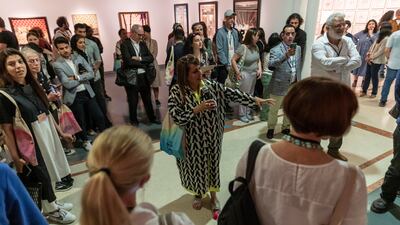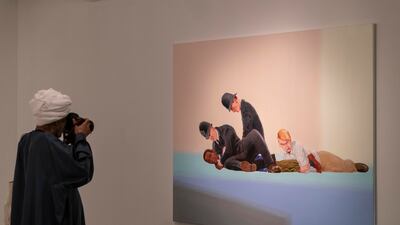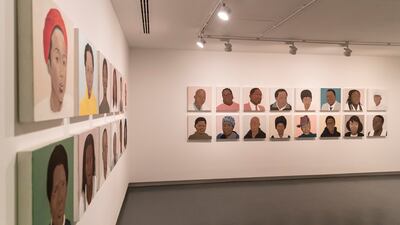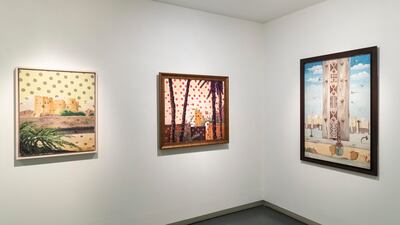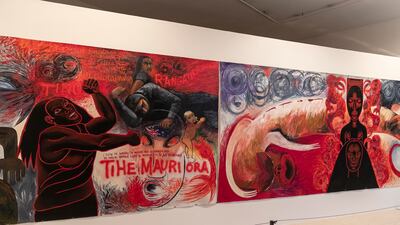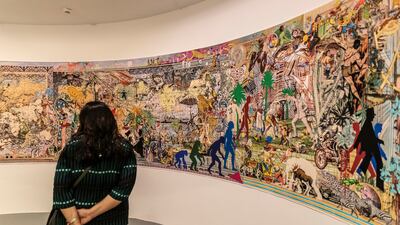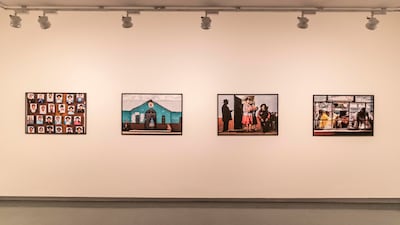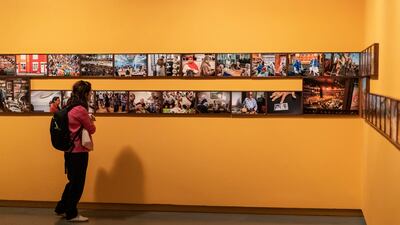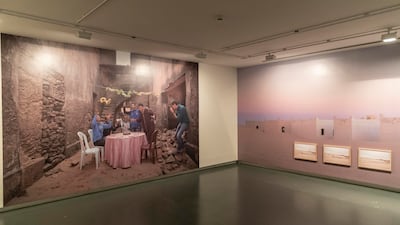Sharjah Biennial kicks off its 15th event on Tuesday with an exciting new programme of works by more than 150 artists from across the world. Now in its 30th year, the biennial will transform 19 venues throughout the city of Sharjah, Al Dhaid, Al Hamriyah, Kalba and Khor Fakkan with a series of exhibitions and installations.
Speaking on Monday at a press conference held between the coral-laced walls of Bait Al Naboodah, Sheikha Hoor Al Qasimi, Sharjah Biennial curator and Sharjah Art Foundation director, said the selection of locations was "a way for us as an institution to expand on our ongoing work with the communities across Sharjah".
“Our work has been happening in those cities for many, many years," she said. "And it's taken time. We’ve worked with communities to make sure that we are not imposing international ideas, or not only thinking about western visitors or international visitors, but really having a conversation and dialogue between local and global.”
This conversation is central to the biennial’s theme of Thinking Historically in the Present, conceived by Nigerian curator, art critic and writer Okwui Enwezor. Prior to his death in 2019, Enwezor asked Sheikha Hoor to carry out his vision and curate the event.
“From the beginning, he was adamant that he was not interested in curating another 'middling' contemporary art exhibition that just disappears,” Sheikha Hoor said.

She went on to read one of the messages Enwezor sent her in their time working together. He wrote: “I see Sharjah as a unique model that grew from a biennial institutionalisation, and the institution that emerged from that has provided a context of thinking and understanding about the pervasive challenges of art and the art worlds and cultural spheres from which art emerges.
"You also engage deeply in a manner that is not superficial with the problems of understanding that often bedevil contemporary art. It's a problem from which misunderstandings arise and in which blind spots persist, and for which you have built engines of mediation and historical, cultural, artistic, pedagogical and discursive amelioration.”
Sheikha Hoor said: “He’s with us in spirit, and I hope he would be proud of all of us coming together.”
Her programme is deeply inspired by Enwezor’s approach to bridging the past and present through a lens of postcolonialism — however, this is crucially informed by her deep-rooted knowledge of Sharjah’s cultural context.
During the event, Sheikha Hoor told The National: “It's been 20 years for me since I took over the biennial. But the reason I did is because I grew up with the biennial, so it has been 30 years of my life.
"For me, it was such a moment of excitement to see all these artists coming to Sharjah and trying to figure out what I wanted to do as a young artist and painter. We were all part of this local scene of artists, and we were all invited to participate. So there was this moment of solidarity, and it was a meeting point.”
Although the event was delayed due to the pandemic, Sheikha Hoor cites an Arabic proverb, "Every delay is a blessing". She says the additional time allowed her to research artists and their practices in greater depth.
The programme now features artists from 70 countries. “I think there are a lot of artists who have been under-represented," she said. "There are a lot of artists who deserve more opportunities and I'm hoping this will be a good platform for them.
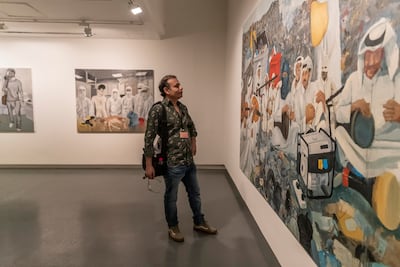
“We have to have this platform of solidarity. We have shared histories, but together we create something much stronger, and our voices are amplified.”
Lee Kai Chung, an artist from Hong Kong who lives in London, has brought a series of works exploring the geographic displacement of people and material — with a particular emphasis on postcolonialism in Asia and Hong Kong.
“For me, this is a very special biennial compared with the others I have participated in, because it's mainly about how artists, people, infrastructure and environment connect under the theme of history — and how we can untangle history and contexts through works of art," he said. "I’m looking forward to seeing the other artists’ work.”
Meanwhile, Argentine photographer Anita Pouchard Serra is unveiling a project about French-Algerian relations following colonialism. Originally from Algeria, she says her work reflects the experiences and memories of the second generation following conflict and independence.
“For me, it's just incredible because in Argentina we are far from everything. Now I’m in a different region of the world so I have access to artists from different cultures. I'm sure I will learn a lot about them, their issues and their methodologies, so it should be fascinating."

One of the groups of artists taking part — Meleanna Meyer, Solomon Enos and Kahi Ching — have flown from Hawaii to attend the opening in Sharjah. Enos said the group have brought a distinctly Hawaiian brand of collaborative mural art to the emirate.
“Usually, a canvas is one artist, one canvas. In Hawaii, we believe in bringing together different people's different visions, because we are a melting pot for the Pacific and ultimately, the world.
“And because we've been so isolated for thousands of years, I think we're effectively like a bolt out of the blue. And we hope that our art can be a form of mediation, and bringing together of cultures in a way that maybe hasn't really been done before.”
Meyer said it was a “very timely moment for all of us to be here together in the arts”.
“I think all of us with our histories have that shared history of pain and loss, and really major trauma. But I think all of us are happy to be here because as a collective, we're doing really interesting things.
“We all have our agendas, but our agenda is a collective healing.”
Sharjah Biennial 15 opens on Tuesday and runs until June 11. More information is at sharjahart.org/biennial-15
